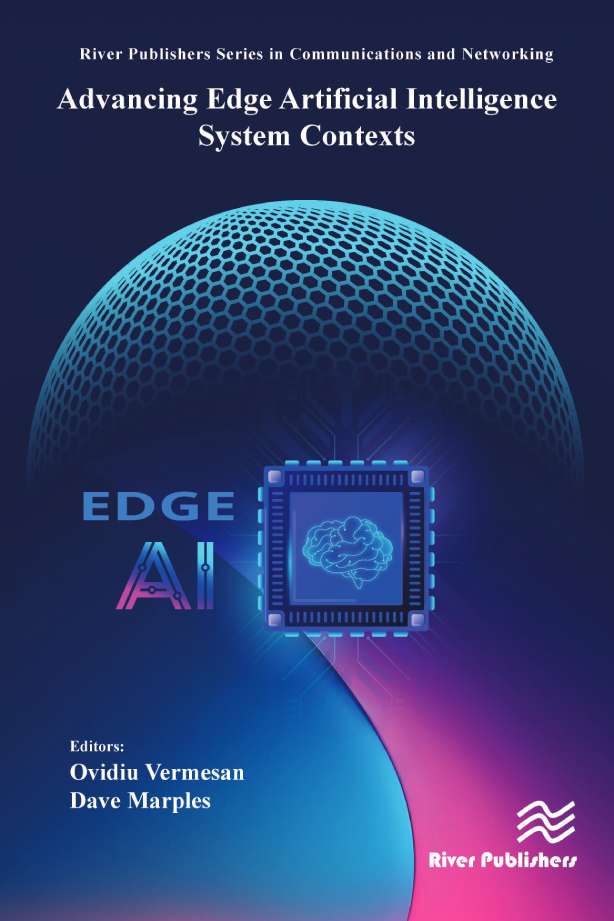River Publishers Series in Communications and Networking
Advancing Edge Artificial Intelligence
System Contexts
Editors:
Ovidiu Vermesan, SINTEF, Norway
Dave Marples, Technolution B.V., The Netherlands
ISBN: 9788770041027 (Paperback) e-ISBN: 9788770041010
Available: November 2023
Recent advances in power-efficient high-performance embedded silicon make edge AI a viable proposition, albeit one requiring new distributed architectures and novel design concepts. Moving decision-making closer to the edge makes responses faster and systems more reliable, while the constant pressure to reduce network bandwidth demand and the need to contain spiralling data storage and operations costs help justify the engineering investment necessary to embrace this new paradigm. Further, moving to decentralised operation opens the door to a multitude of novel applications, covering immersive technologies and autonomous systems across fields as diverse as healthcare and industrial automation, personal assistance and prognostics, surgery, and process control. In the best tradition of systems engineering, the first stage of this transition process is understanding the application domain for edge AI deployment, the "system context".
This book presents some key topics and early thinking from the EdgeAI* project, covering data backhaul technologies, lifecycle management, mechanisms for developing AIs at the edge and techniques for interacting with those AIs. It provides examples of application domains before concluding with a review of how edge AI systems can be understood by their users. It also examines and presents new results based on current investigations and activities in edge AI technologies, considering the future trends in autonomic systems, hyperautomation, AI engineering, generative AI, connectivity, and cybersecurity mesh.
This book also aims to empower the reader with the knowledge and insights needed to understand and embrace the transformative power of edge AI technology. The extensively referenced chapters, contributed by experts and thought leaders in the field, are recommended to anyone interested in developing edge AI systems.
*Edge AI Technologies for Optimised Performance Embedded Processing” (EdgeAI) Key Digital Technologies (KDT) Joint Undertaking (JU) European research project. https://https://edge-ai-tech.eu/
Edge AI LoRa Mesh Technologies
by Ovidiu Vermesan, Kai vormWalde, Roy Bahr, Cordula Conrady,
Janis Judvaitis, Gatis Gaigals, Tore Karlsen, Marcello Coppola,
and Hans-Erik Sand
Edge AI Lifecycle Management
by Dinu Purice1, Francesco Barchi, Thorsten Röder, and Claus Lenz
Federated Learning: Privacy, Security and
Hardware Perspectives
by Taha Yassine Abidi, Iyad Dayoub, Elhadj Doguech, and Ihsen Alouani
Inside the AI Accelerators: From High
Performance to Energy Efficiency
by Ana Pinzari, Adrien Prost-Boucle, Christelle Rabache,
and Frédéric Pétrot
Designing Lightweight CNN for Images:
Architectural Components and Techniques
by Lilian Hollard, Lucas Mohimont, and Luiz Angelo Steffenel
Natural Language Conditioned Planning of
Complex Robotics Tasks
by Toms Eduards Zinars, Oskars Vismanis, Peteris Racinskis,
Janis Arents, and Modris Greitans
An Overview of the Automated Optical
Inspection Edge AI Inference System
Solutions
by Claudio Cantone and Alberto Faro
Efficient AI-based Attack Detection Methods
for Sensitive Edge Devices and Systems
by Daniel Hirsch, Falk Hoffmann, Andrija Neskovic,
Celine Thermann, Rainer Buchty, Mladen Berekovic,
and Saleh Mulhem
Explainability and Interpretability Concepts
for Edge AI Systems
by Ovidiu Vermesan, Vincenzo Piuri, Fabio Scotti, Angelo Genovese,
Ruggero Donida Labati, and Pasquale Coscia
